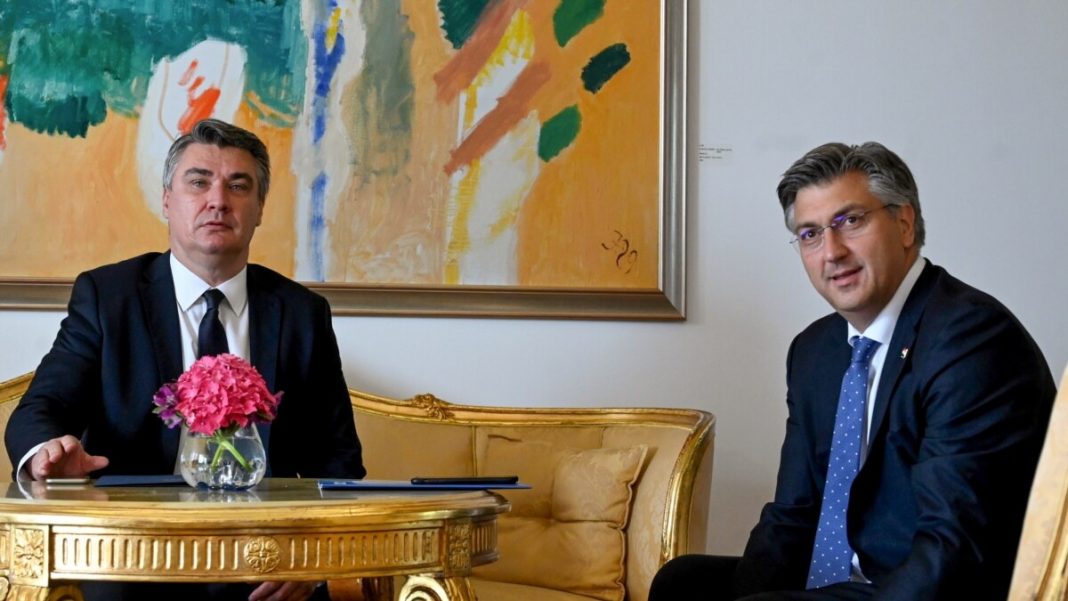In 2024, there will be a whole scattering of elections in Croatia: to the European Parliament, parliamentary and presidential. The next parliamentary elections planned for the fall turned into early ones. They were immediately dubbed the most unpredictable in the entire history of the country’s independence, both in terms of results and in terms of influence on Croatian foreign policy.
The prologue to them were protests by thousands of people against corruption in government. In February, thousands of people rallied in the Croatian capital, Zagreb, accusing the ruling centre-right HDZ (Croatian Democratic Union) party of corruption and demanding early parliamentary elections. Opponents of Prime Minister Andrej Plenkovic waved flags and posters with the inscription “Enough!” and also shouted: “Down with!” and “Elections are now!” The rally was organised by 11 centrist and left-wing opposition parties, which demanded the immediate holding of parliamentary elections because the new prosecutor general, Ivan Turudić, appointed by Prime Minister Plenković, was associated with people involved in corruption and crime. Several hundred journalists staged a protest in Zagreb against the authorities’ intentions to pass a bill for punishment for those who provide the media with data from judicial investigations. The opposition believes this law’s purpose is to protect politicians close to Plenkovic from liability.
In this article, Ascolta analyses the political situation in Croatia, a small Balkan state that is the youngest member of the European Union. A number of election campaigns and a difficult internal political situation have contributed to the current events in Croatia, which largely reflect the general mood throughout the Balkan Peninsula.
This Content Is Only For Subscribers
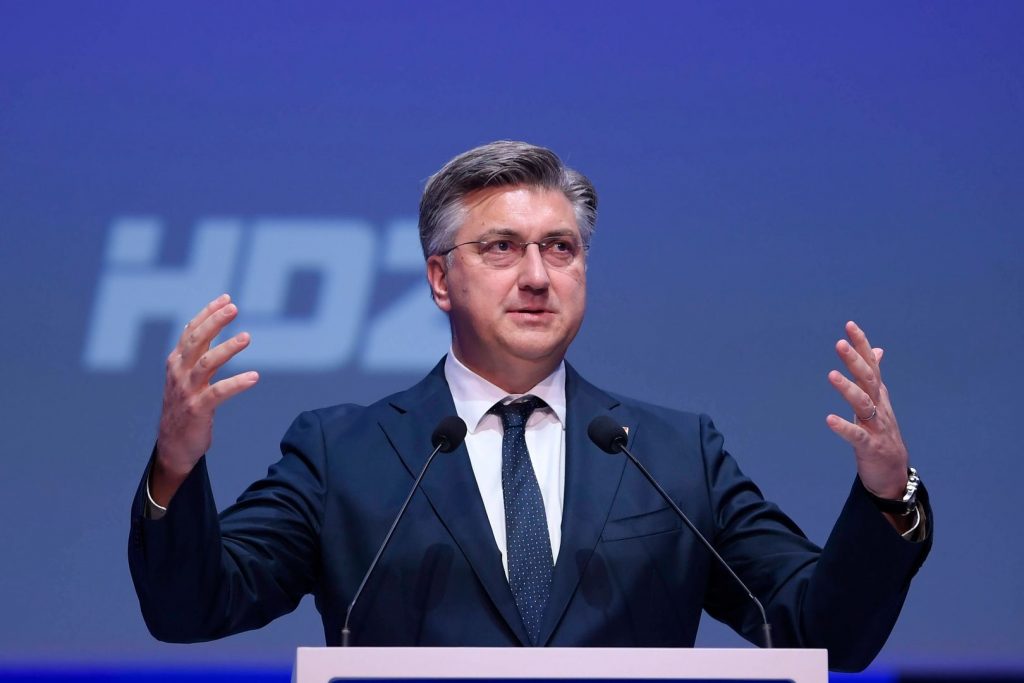
With 142 votes in favour in March, the Croatian Sabor dissolved itself. The initiator of this decision was Croatia’s Prime Minister, Andrej Plenkovic. According to experts, accusations of corruption against the prime minister and his pro-government CDU and a decline in personal and party ratings forced Plenkovic to take the lead. By the fall, the electoral situation for the CDU could have become even sadder. As a result, President Zoran Milanovic announced that early parliamentary elections would occur on April 17.
Members of Parliament are elected in three ways. Using a proportional system, one hundred forty deputies are elected in 10 electoral districts (14 seats for each district). Parties must overcome the 5% threshold. Three seats for Croats living abroad and their descendants, the so-called foreign constituency, in which more than 220 thousand voters live. Of these, almost 100 thousand are in Bosnia and Herzegovina (BiH), where they traditionally support the HDZ. The remaining eight seats are reserved for national minorities, including three seats for Serbs. 3.73 million Croatian citizens have the right to vote and can exercise their constitutional right at 6.5 thousand polling stations.
Having set the election date, Milanovic announced that he intended to become a candidate for prime minister from the opposition Social Democratic Party. This statement had the effect of a bomb exploding and outlined the main trend of the campaign: the elections will be in the shadow of the merciless struggle between the President and the prime minister.
A fly in the ointment
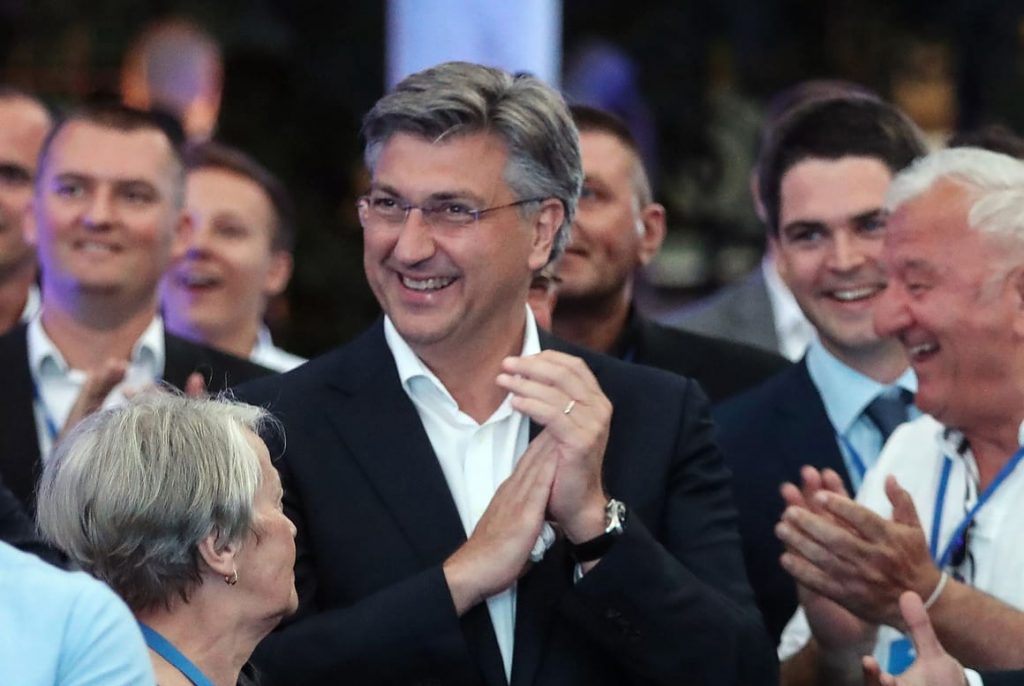
On the 17th floor of Zagreb’s Westin Hotel, where the HDZ headquarters was located, the atmosphere on election night was fairly subdued. There was no usual festive atmosphere, although the CDU won convincingly throughout the evening. The first exit polls did not evoke emotions. But when the first official results were announced in the lobby of the Westin Hotel, euphoria reigned – “victory, victory…” shouted the party activists present. Then, accompanied by CDU VIPs and to the rhythm of the song “Eye of the Tiger,” Andrej Plenkovic entered the stage. Addressing his supporters, he announced the third victory of the HDZ, thanked voters for the record 61.83% turnout, declared that he would not refuse cooperation with any losing party except President Milanović’s SDP, and optimistically promised that the majority in parliament and the government would be soon formed. And then, as they say, curtains, champagne flowing like a river and the ritual eating of the birthday cake.
However, there was also a fly in the honey barrel ointment. The victory of the ruling HDZ, which received 61 parliamentary seats out of 151 seats in the local parliament of Sabor, was overshadowed by Plenkovic’s party receiving five fewer seats compared to the last parliamentary elections. Now, to find the coveted 76 votes and form a parliamentary majority and government, the Conservatives will have to rely on the support of other political players. Some of them, like a “jack in the box”, jumped out from behind the struggling political titans from the CDU and SDP and finished with results that allowed them to influence the formation of the government majority as owners of the so-called “golden shares”. Such political forces include the far-right party “Motherland Movement” (DP), which received 14 mandates in the elections, the centre-right “Most”, which has 11 seats in the Sabor, and the left-green party “We Can!” which has ten bayonets.
Prime-Presidential War
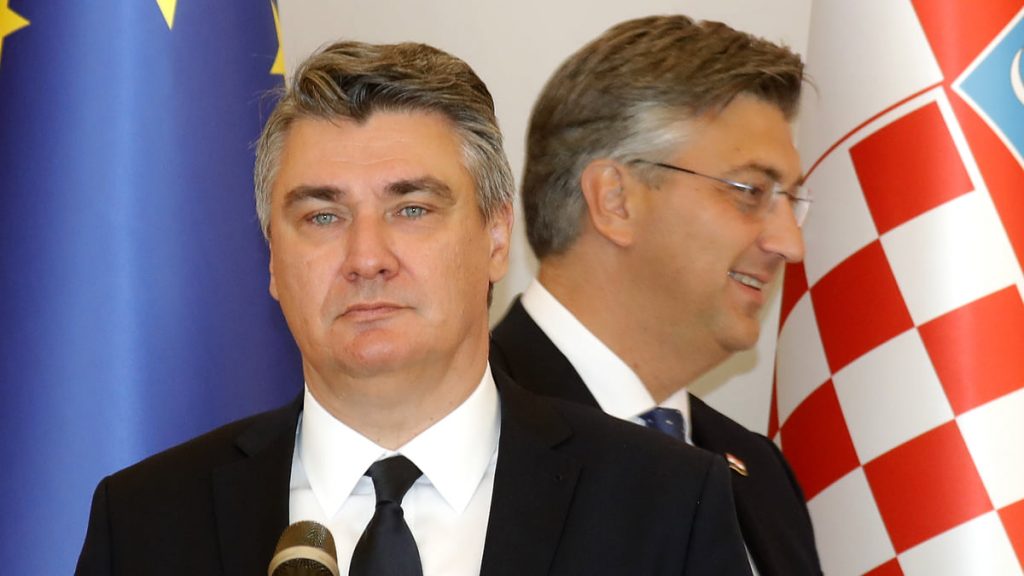
According to experts, the origins of the long-standing confrontation between the prime minister and the president stretch back to when they worked together at the Foreign Ministry and shared an office.
Russia’s full-scale aggression against Ukraine has further intensified their confrontation. While Andrej Plenkovic’s government supported the EU’s policy towards Russia and Ukraine, President Zoran Milanovic took a different position. Although he called the entry of Russian troops into the territory of Ukraine “aggression,” he at the same time actively criticised Western policies in the Ukrainian crisis and even prevented the training of the Ukrainian military in Croatia. Moreover, Zoran Milanovic threatened to block the entry of Sweden and Finland into NATO, to which Prime Minister Andrej Plenkovic reacted harshly, calling the president “a manipulator, a vandal and a person with pro-Russian views.” However, since Croatia is a parliamentary republic and real power lies in the hands of the government, the president had little chance to influence the country’s foreign policy seriously. But in the prime minister’s chair, Zoran Milanovic’s ability to determine the country’s foreign policy course would increase sharply.
It must be said that the start of the election campaign, after the president’s announcement that he intended to compete for the prime minister’s seat, brought him and his Social Democratic Party the first dividends. Just two days later, polls showed that 32% of Croatians wanted to see Zoran Milanovic at the head of the government, and only 30% wanted to see current Prime Minister Andrej Plenkovic. And the rating of the Social Democrats increased by nine percentage points compared to the previous month! And in Europe, they were no longer whispering but loudly talking about a possible change in Croatian foreign policy if its current president became the country’s prime minister.
However, as the elections approached, the balance of power in Croatia began to change gradually. And Milanovic himself was to blame for this. Having announced his desire to lead the Social Democrats’ campaign and then the government, Zoran Milanović refused to resign as president. In its decision, the Constitutional Court of Croatia banned him from running until the end of his presidential term in February 2025. Milanovic ignored this decision and called the judges “illiterate peasants” and a “gangster group.” Although his name was not on the opposition’s electoral lists, he continued campaigning and claimed that he would form a new government. Almost every day, at meetings with journalists or on social networks, he harshly criticised the ruling party and the prime minister, accused them of corruption and called for voting “for anyone other than the HDZ and Plenkovic.” Milanovic’s harsh insults against his political opponents, whom he called either “gangsters” or “parasites,” earned the president the nickname “Croatian Trump.”
Prime Minister Plenkovic called Milanovic’s participation in the elections and refusal to leave the presidency nothing more or less than an “attempt at a coup d’etat,” and many voters suspected Milanovic of foul play. The verbal duel between the president and the prime minister continued until the last day of the election campaign.
If, in matters of foreign policy, Milanovic and Plenkovic are irreconcilable antagonists, then in matters of domestic policy, there was no significant difference in their rhetoric. Both advocated for an increase in living standards and sustainable development of the country and were concerned about the high level of inflation in the eurozone, labour shortages, and the growth of illegal migration. The HDZ also hoped to receive support from Croatia’s accession to the EU, the introduction of the euro and an increase in the number of tourists visiting the Adriatic coast. The left opposition promised to increase pensions if they won the elections. “Along with the change of state prosecutor Turudić, our main measure in the first week will be a change in the pension harmonisation regime. Also, with the first amendment to the budget, we will introduce an increase in pensions to return to pensioners everything that Plenkovic took from them over the past four years,” promised Peja Grbin, chairman of the Social Democratic Party of Croatia.
Indeed, Plenkovic’s “Achilles heel” is corruption in government. Transparency International ranks Croatia as the fifth most corrupt EU country after Greece, Romania, Bulgaria and Hungary. And many voters are simply tired of the party, with its numerous corruption scandals. During Plenkovic’s two prime ministerial mandates, more than 30 ministers were dismissed on suspicion of corruption. All this gave additional “trump cards” to Milanovic, who called the prime minister “the godfather of crime” and accused the HDZ of “massive theft” of public funds.
Plenkovic, in power since 2016, denied this and warned that Milanovic could bring EU and NATO member Croatia closer to Russia as prime minister. By the way, some experts, on condition of anonymity, reported that the political surroundings in the struggle between the president and the prime minister are just the tip of the iceberg. Two influential Croatian clans entered the fight for the prime minister’s mandate and, therefore, for state resources, one of which was associated with the scandalous past Croatian company Agrokor, the property of which, after bankruptcy, with accounts payable to the Russian Sberbank and VTB The bank, at the stage of state administration that coincided with the period of Milanovic’s premiership, was transferred to the international conglomerate Fortenova Group, whose owners include the same Sberbank and VTB Bank.
The first election results showed that the pre-election war between the president and the prime minister ended with a temporary victory for Andrej Plenkovic, whose CDU showed the best result but not enough to win an absolute majority. As the Croatian Morning Gazette notes, the HDZ party functionaries it interviewed spoke about the end of Plenkovic’s dominance in the party, noting that his position would not be so unshakable if he remained at the helm of the HDZ. As arguments, they cite not only the worse party result compared to previous elections but also personal voting for it. Thus, in the first district, Andrej Plenkovic received 33,066 votes, and the vice-president of the HDZ and Minister of Defense Ivan Anusic – in the fourth, he collected a record 37,527 votes.
One way or another, Milanovic’s plan to destroy the CDU as a political project failed. The Rivers of Justice coalition, led by the opposition Social Democratic Party, whose informal leader is the president, took second place with only 42 seats. The PSD was also disappointed that President Milanovic’s controversial support hurt the election campaign’s course and did not bring new mandates. Moreover, the president’s bid for the premiership mobilised right-wing voters. As a result, turnout, which usually barely reaches 50% in elections in Croatia, this time exceeded 60%. As a result, the total number of mandates has changed little compared to 2020, and the Croatian president’s chances of moving to the prime minister’s chair have become extremely small.
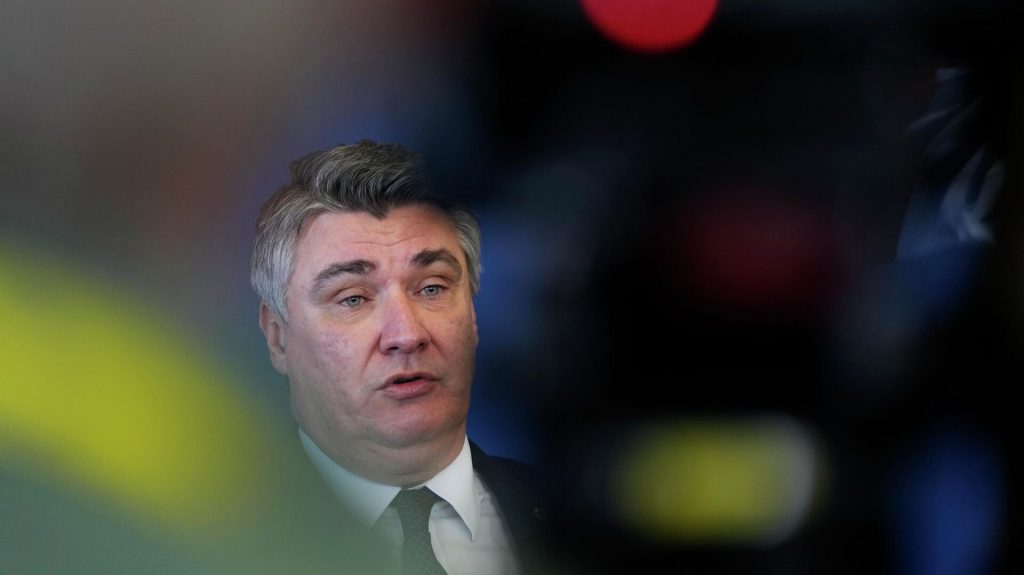
He, it seems, realised this himself. Therefore, the president, who usually does not skimp on loud statements, remained silent throughout the night after the elections and the leader of the PSD, Peja Grbin, took the rap for him, who tried, as they say, to put a good face on a bad game. He noted that although the party hoped for a better result, it did not give up. “It’s not over yet,” he said. “We have days, weeks and perhaps months of negotiations ahead, and they will lead to changes that will make Croatia a better place.” He supported his statement with the words of Sandra Bencic, the leader of the left-green party We Can! supported by the opposition from parties of the left and right.
President Milanovic, in a Facebook post, confirmed the ongoing negotiations for the formation of a new parliamentary majority. He also shared a message on Telegram, suggesting that the “Rivers of Justice” coalition had already secured the support of 57 representatives. These include members of Mozemo! with 10 mandates, regionals from the IDS “Istrian Democratic Sabor” with 2 mandates, the same number from the Independent Platform of the North Matija Posavac, and a representative from Fokus with 1 mandate. However, to complete the coalition, the support of the Most party, which has 11 mandates, is still needed.
To complete the coalition portrait, one stroke was missing in the form of support for the Most party, which has 11 mandates. One of the leaders of this centre-right party, Nikola Grmoja, immediately rejected the possibility of creating a coalition with the HDZ due to corruption scandals around the party. He is not delighted with the coalition with the Social Democratic Party. However, still, there was no definite statement about it – no, but a more neutral one: “… let’s see how events will develop.” He wrote on Twitter: “I call on the DP, or at least the uncompromised parts of the DP, to try to create a broad coalition against the HDZ to send Plenkovic and his party into opposition.”
Golden share and keys to the coalition
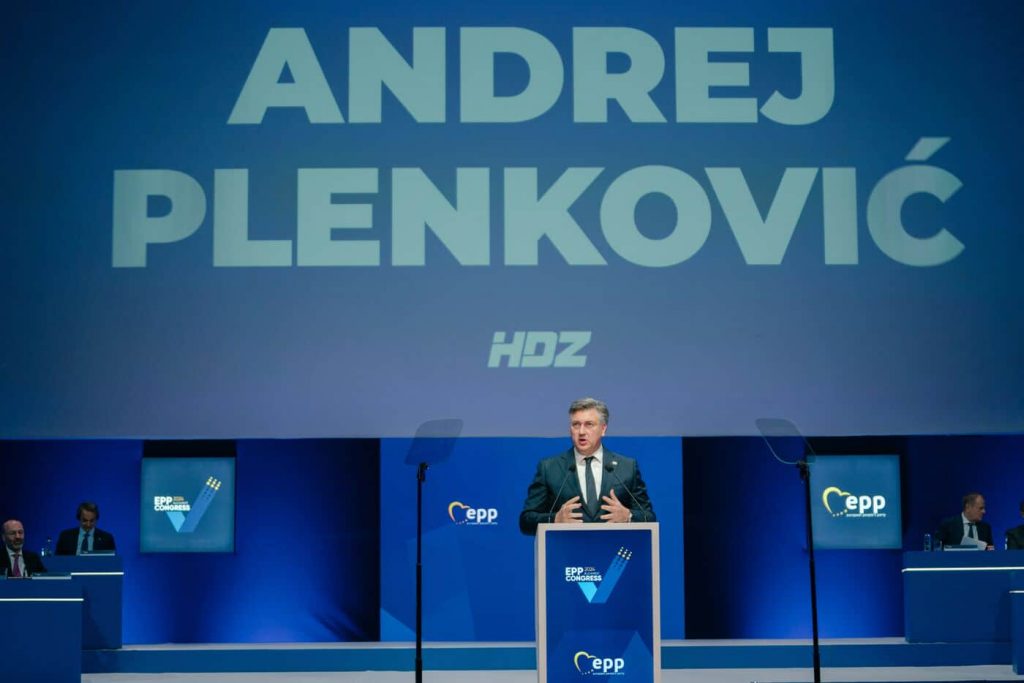
Another winner of the elections was the far-right party, which in Croatian transcription sounds like “Domovinsky Pokret” (DP) and, in translation, “Fatherland Movement” or “Motherland Movement”. The party received 14 mandates in the Sabor’s new composition, became the country’s third political force, and was the most “desired bride” for concluding a political marriage and forming a future government.
The success of the DP looks even more significant given that this political project has existed for only four years. In 2020, it was created by singer and showman Miroslav Shkoro, a name that contributed to the recognition and media visibility of the party. With each passing month, the new political project grew more robust and was replenished with new people of both centrist and ultra-right views, which in turn gave rise to more than one internal party conflict in the future. But the real shock for the DP came in 2021, when its leader, Miroslav Shkoro, left the party, explaining his action by saying that he was disappointed with what his political project had become.
Informed sources reported that there was a fierce struggle between two factions in the party, in which Shkoro was defeated. After Škoro’s resignation, the party was temporarily headed by Mario Radić, who was at the head of the business wing in the party structure. Then, the new head of the DP became the mayor of the city of Vukovar, Ivan Penava, who had previously been in Plenkovic’s party and left it with a scandal, and then, together with several deputies of the Vukovar city council from the HDZ, created his project – the “Independent List of Ivan Penava” party. Having been free for a short time, in October 2021, the Democratic Party made him an offer that Penava could not refuse – he headed the Fatherland Movement party.
Today, there are two leaders in the party: the formal Ivan Penava and the “shadow” Mario Radic, as well as two currents, one of which supports an alliance with Plenkovic and the other – supporters of President Milanovic. So, the party leaders will largely determine the prospects for the future coalition. The DP’s information agenda at these elections differed significantly from the position of the European far right regarding LGBT rights, the gender issue, and migration policy. As for relations with Kyiv, they are not particularly concerned about the war in Ukraine. On the contrary, they criticised Plenkovic for caring more about Ukraine than his own country and people in these difficult times.
During his political activities, Ivan Penava spoke differently about his former CDU boss, Andrej Plenkovic. From statements that Plenkovic is the best prime minister in the entire history of Croatia to statements that he lacks honour, conscience, and leadership qualities and that his criminal clique must go. And Andrei Plenkovich himself, before the elections, short-sightedly declared that an alliance with the Democratic Party was impossible and thereby violated the main political principle: never say never.
He has sharply changed his rhetoric and does not consider an alliance with the Democratic Party shameful and unnatural. In any case, it is clear that negotiations between the CDU and DP on a possible coalition will not be easy. As for the other contender for the coalition, the PSD, despite Penawa’s post-election statements that we will talk to everyone, such an alliance seems unlikely. The problem for the SDP is that even purely mathematically, negotiations with the Motherland Movement will not necessarily help them reach the required 76 mandates to form the government. And besides, these two parties are not precisely natural political friends. And such a partnership will alienate other potential allies.
Post-election arithmetic
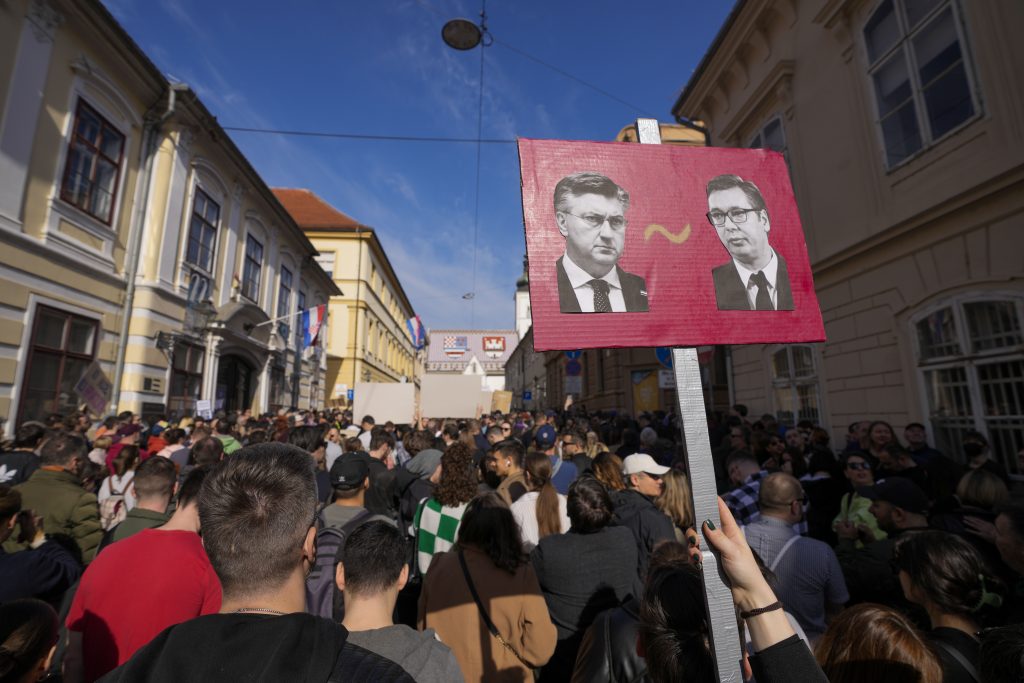
The election results showed that parties from the nationalist right to the green left won a significant number of seats in parliament. Neither the prime minister’s ruling CDU party nor the SDP, which the president supports, won enough seats to form a government. Croats are preparing for political bargaining to form a governing coalition or, failing that, a viable minority government.
The leader of the liberal Most party, Bozho Petrov, immediately outlined the party’s position in the coalition scenario, saying that he could not join the government led by the HDZ. His party was previously part of a coalition with the CDU, but it will not join this time: “The CDU must go into opposition,” Petrov said. A similar position is shared by one of the leaders of the left-green “Mozemo!” (“We can!”) Sandra Bencic formulated her main political goal – to send the CDU to the political dustbin. The head of the far-right Fatherland Movement (DP), Ivan Penava, on the contrary, enjoying his “golden share” and realising that it was hardly possible to form a government without his political strength, announced a bargain: “The main thing is that we talk to everyone.”
Prime Minister Andrej Plenkovic was forced to count the votes needed to create a coalition from abroad. The day after the elections, he went to Brussels for an extraordinary summit of leaders of EU member states, dedicated to foreign policy issues, primarily the situation in the Middle East after the Iranian attack on Israel.
It would seem that the simplest mathematical option for the prime minister looks like this: HDZ – 61 votes + far-right DP – 14 mandates + Independent Democratic Serbian Party (SDSS) – 3 mandates—total – 78 votes, with the required 76. However, politics is an automatic addition of votes and a considerable role in the human factor. The Serbian minority party SDSS is in a government coalition with the HDZ today. Its leader, Milorad Pupovac, is happy with his current position and is not against becoming an ally of Plenkovic again. In the meantime, according to Pupovac, SDSS will focus primarily on negotiations with its previous partners, representatives of national minorities. The party leader was pleased with the election results since his party not only confirmed its three mandates but strengthened them with significantly larger votes.
However, the far-right Fatherland Movement (DP) party does not want to join the duo of the HDZ and SDSS, which has already stated that it will never enter into a coalition with the Serbian Minority Party. The first insights from the negotiations between the HDZ and DP indicate that the HDZ would still like to see representatives of the Serbian national minority in the coalition, even if only in parliament and not in the government. However, the DP insists that Milorad Pupovac’s party should not have a majority in this composition.
By the way, some deputies do not see themselves in a coalition with the CDU in the DP itself. So one of them, Kolakusic, has already stated that he is taking this mandate to continue his career in the EU Parliament, and the other two, a partner of the DP, one of the founders of the Law and Truth party, Ivan Lovrinovic and Ivan Sincic, directly said that no one should support the CDU. In such situations, Plenkovic has only 72 “bayonets” left in the coalition with the Democratic Party with a deficit of 4 mandates. However, Andrey Plenkovich has a reputation as an unrivalled master of holding small batches. He can easily find the missing votes in the same minorities, without the Serbs, who give him five more mandates and the desired majority of 77 people. Today, this option looks like the most realistic compromise. However, there is another way, without DP. Having eight mandates for representatives of national minorities, Plenkovic seeks the “love” of the “regionals” from the Istrian Democratic Assembly – 2 mandates, the centre-left Independent Platform of the North – 2 mandates and Focus – 1 mandate. Plenkovic can more than compensate for the missing two mandates with the help of two “defectors”, or as they were once called in the Ukrainian Verkhovna Rada, “carcasses” from the DP and “Most”. This option looks quite workable. We will soon find out which way the CDU and its leader, Andrej Plenkovic, will go.
However, if the prime minister manages to form a coalition government, significant changes in foreign policy, which were frightening in the EU, will not happen in Zagreb. Andrei Plenkovich himself clearly stated this on the night after his election victory.
Zoran Milanovic’s post-election arithmetic is much more complicated than that of his political opponent. The problem for the SDP is that even negotiations with the Fatherland Movement will not help them overcome the barrier of 76 mandates. The natural political allies of the SDP are the green-left “We can!” insist that it is not interested in supporting any government that includes the DP. And this makes it difficult to form a coalition “from the centre to the left” in which “Mozemo!” could participate or at least support it.
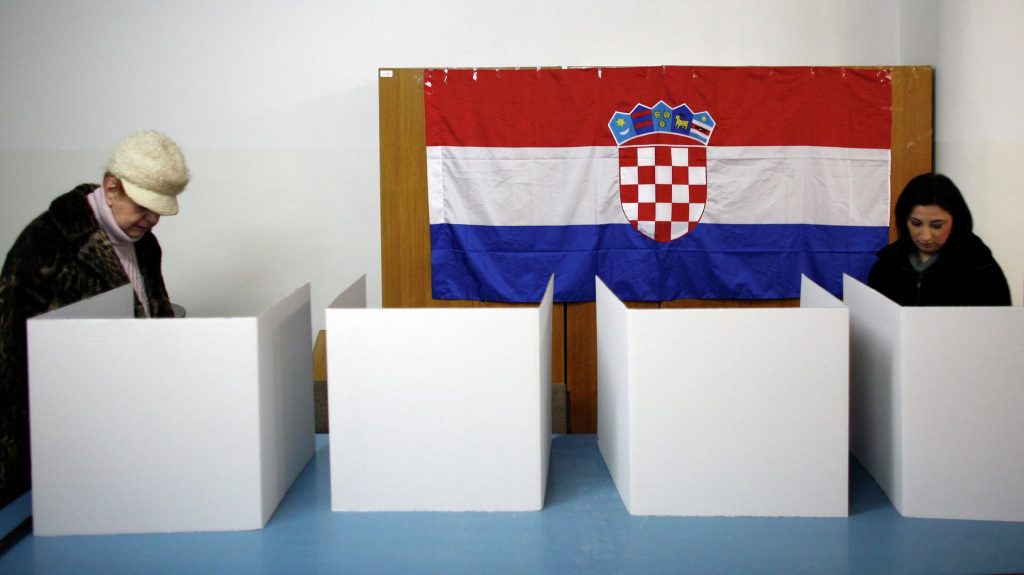
Milanovic lacks as many as 34 mandates to reach the cherished majority. And it’s not easy to eliminate such a handicap. Even if we imagine purely hypothetically that he managed to enlist the support of representatives of national minorities (eight representatives), Focus (one), Independent Platform North (2 mandates), IDS (two) and ten mandates of Mozemo! for complete happiness he will not need another 11 mandates. This means they must come either from the far-right Fatherland Movement party or from the centre-right Most, which, in principle, does not look like something out of science fiction but is associated with complex negotiations and large concessions. Another significant problem in forming a coalition will be the ambitions of party leaders in their desire to lead the government. President Milanovic, the head of the SDP Pejo Grbin and the leader of Mozemo! have such ambitions. Sandra Bencic. Considering possible coalition bargaining with Most, it is unlikely that their leader, Bozho Petrov, will agree to anything less than the post of prime minister.
Most likely, Milanovic will still remain in the post of president and, as required by the Constitution, will propose to a future candidate for prime minister, either from the right or from the “spotty” coalition, to form a new government. If the parties fail to gather a parliamentary majority and elect a prime minister, a technical government will be appointed headed by Plenkovic, and then the same Milanovic will again announce the date, but for new early elections…

